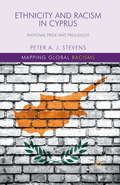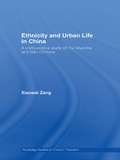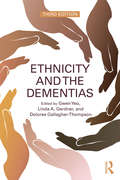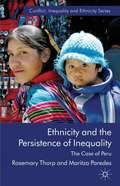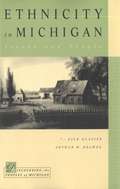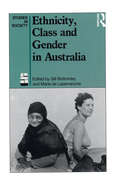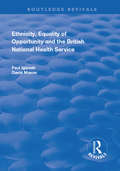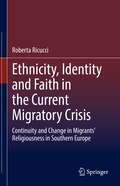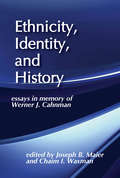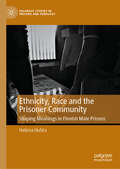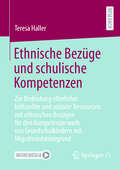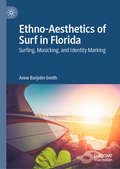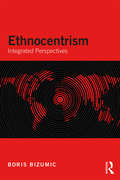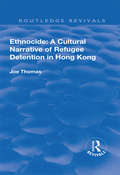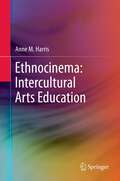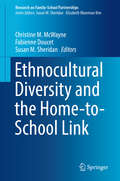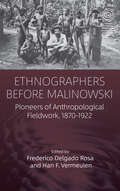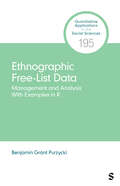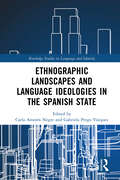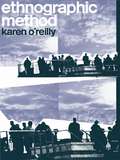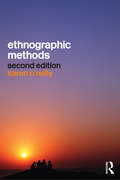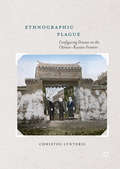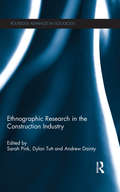- Table View
- List View
Ethnicity and Racism in Cyprus: National Pride and Prejudice? (Mapping Global Racisms)
by P. StevensInvestigating the relationship between ethnic pride and prejudice in the divided community of Cyprus, this book focuses on the ethnic stereotypes that Greek and Turkish Cypriot secondary school students develop of each other and other ethnic groups in Cyprus.
Ethnicity and Urban Life in China: A Comparative Study of Hui Muslims and Han Chinese (Routledge Studies on China in Transition #7)
by Xiaowei ZangThis much-needed work on ethnicity in Asia offers a major sociological analysis of Hui Muslims in contemporary China. Using both qualitative and quantitative data derived from fieldwork in Lanzhou between March 2001 and July 2004, it looks at the contrast between the urban life of the Han people, the ethnic majority in the city of Lanzhou, and the Hui people, the largest ethnic minority in the city, and assesses the link between minority ethnicity and traditional behaviour in urban sociology and research on ethnic groups of China. In-depth interviews and survey data provides a fresh perspective to the study of ethnic behaviour in China, and offers a rich account of Hui behaviour in seven aspects of urban life: neighbouring interaction, friendship formation, network behaviour, mate selection methods, spouse choice, marital homogamy, and household structure. Contributing to the global discourse on Islam, religious fundamentalism and modernity, this book will be invaluable to anyone interested in Chinese society, Islam, religion, development, urban studies, anthropology and ethnicity.
Ethnicity and the Dementias (Third Edition)
by Gwen Yeo Linda A. Gerdner Dolores Gallagher-Thompson<p>In recent years, the literature on the topic of ethnic and racial issues in Alzheimer’s disease and other dementias has increased dramatically. At the same time, the need for cultural competence in all of geriatric care, including dementia care, is increasingly being acknowledged. Dementia is a large societal problem affecting all communities, regardless of race or ethnicity, and understanding dementia for specific groups is tremendously important for both clinical knowledge and for health planning as a nation. <p>This third edition of Ethnicity and the Dementias offers invaluable background information in this area, while also examining how those suffering from dementia and their family members respond or adapt to the challenges that follow. Thoroughly updated and revised throughout, the book features contributions from leading clinicians and researchers in the field, with particular attention given to genetic and cultural factors related to dementia, effective prevention and treatment strategies, and issues in caregiving and family support. Chapters offer specific recommendations for dementia care in 11 ethnic/racial groups, as well as suggestions for working effectively with LGBTQ+ families. <p>Providing a truly comprehensive resource on ethnicity and dementia, and including reflections on emerging trends and the future of caregiving, this new edition is ideal reading for clinicians, educators, researchers, policy makers, and families, in search of the most current ethnogeriatric findings.</p>
Ethnicity and the Persistence of Inequality
by Rosemary Thorp Maritza ParedesUnderstanding why inequality is so great and has persevered for centuries in a number of Latin American countries requires tools that go beyond economics. Investigating the case of Peru, this book explores how inequality is embedded in institutions that constitute the interface between the economy, the polity and geography of the country.
Ethnicity in Michigan: Issues and People
by Jack Glazier Arthur W. HelwegAt a time of heightened consciousness about ethnicity, the publication of a series of small volumes on the many ethnic groups that have helped shape the history of a culturally diverse state such as Michigan is altogether fitting.
Ethnicity, Class and Gender in Australia (Studies In Society (sydney, N.s.w.) #Vol. 24)
by Gill Bottomley Marie M. de LepervancheEthnicity, Class and Gender in Australia is a major study of the impact of immigration on Australian society, and of the fragmentation that has developed along ethnic, class and gender lines. Rather than thumbnail sketches of ethnic groups or celebrations of multiculturalism, it offers detailed critiques of policy and practice, backed up by evidence from the experiences and research of the authors.This book confronts issues crucial to all Australians: the increasing fragmentation of the workforce; the class, gender and origin-based inequalities present in an 'egalitarian' country; and the ideologies, from racism to multiculturalism, designed to mask these inequalities.The authors also point to evidence of growing resistance to the status quo, and strategies for working towards a more genuine equality - to more positive education programmes, to political action at the workplace and beyond. The aim is to broaden readers' understanding of Australian society by including those who are so often omitted from analysis of that society.
Ethnicity, Equality of Opportunity and the British National Health Service
by David Mason Paul IganskiThis title was first published in 2002: Numerous reports have identified the serious problems of under-representation of, and discrimination against, minority ethnic groups in the British NHS. It is widely argued that this both raises issues of social justice and undermines the quality of service to minority ethnic patients. Nowhere are these problems more acute than among the largest occupational group in the NHS - nurses. This book reports the results of research carried out for the English National Board for Nursing, Midwifery and Health Visiting to evaluate NHS equal opportunities policy. Drawing on additional original research involving interviews with key policy actors, this fascinating book examines the prospects for a national strategy linking the business and justice cases for the delivery of greater equity in employment and service delivery.
Ethnicity, Identity and Faith in the Current Migratory Crisis: Continuity and Change in Migrants’ Religiousness in Southern Europe
by Roberta RicucciThis monograph considers the Catholic/Christian religious identity of young immigrants within the migratory diasporas in Southern Europe. It details important ethnographical work on various groups, such as the family, ethnic communities, and peers. The author also considers the role of institutional figures in mainstream society. These include teachers, administrators, and social workers. This valuable research material helps readers to better understand the viewpoint of young people (especially the children of immigration) in relation to various environments which are important in their lives. The investigation examines theoretical and practical questions regarding the study of relations between religion and migrations. It pays particular attention to both the youth perspective and the effects of the current refugee crisis on the perception of religious diversity and identity. Coverage also looks at similarities and differences between young migrant and their native peers. In addition, three case studies further help illustrate the main points of the author's argument. The book uses preliminary research carried out in Italy. It also features interviews collected in Portugal and Spain. Those interviewed include people with migratory background who are permanent residents, belong to the second generations, or are recently-arrived asylum seekers. Overall, the author provides readers with an interesting and innovative portrait of children of immigrants and their relations with faith in the post-secularized Europe: indeed, by considering both academic debates and original empirical data, the book offers the possibility of reframing the link between migrations and religious identities.
Ethnicity, Identity, and History: Essays in Memory of Werner J. Cahnman
by Joseph B. MaierIn a wide-ranging analysis of the drama of history, the importance of ethnicity, and Jewish identity, these essays explore areas of political and cultural disciplines fused with elegance in the work of the late eminent sociologist Werner J. Cahnman. The prominence of the American and European historians, philosophers, geographers, sociologists, and anthropologists in this volume represents evidence of the wide effect that Cahnman's work had on scholars in a number of fields in academic work. This volume will make timely and rewarding reading for social scientists and historians, especially those concerned with the religious factor.Contributors: Joseph B. Maier, Chaim I. Waxman, Louis Dumont, Karl Bosl, K.M. Bolte, Edmund Leites, Lewis S. Feuer, Lester Singer, Harriet D. Lyons, Andrew P. Lyons, Alvin Boskoff, Nathan Glazer, Irving Louis Horowitz, Herbert A. Strauss, William Spinrad, Calvin Goldscheider, Saul B. Cohen, and Emmanuel Maier.
Ethnicity, Race and the Prisoner Community: Shaping Meanings in Finnish Male Prisons (Palgrave Studies in Prisons and Penology)
by Helena HuhtaThis book draws on an in-depth ethnographic study to explore the meanings and consequences of race and ethnicity in daily life within two Finnish male prisons. Set within the context of Finnish immigration, it provides an excellent backdrop for studying social processes in the prison environment launched by a rapid growth in the number of foreign national prisoners. It builds on the sociological attempts to comprehend the nature of the prisoner community from the perspective of ethnicity and race which has gained attention since the 2000s. It explores how ethnic categories are formed in the prison space, prisoner hierarchy and its logics, conflicts and conflict-solving, discrimination and prison officers and development of distinctive prisoner cultures. The study captures the consequences that signifying ethnicity and race have on daily practices, equality, and safety in prison. This book shows how ethnic and racial categories are formed in social action and further, how their meanings are in a constant process of change.
Ethnische Bezüge und schulische Kompetenzen: Zur Bedeutung elterlicher kultureller und sozialer Ressourcen mit ethnischen Bezügen für den Kompetenzerwerb von Grundschulkindern mit Migrationshintergrund
by Teresa HallerDer Band beschäftigt sich mit der Bedeutung migrationsbezogener elterlicher Ressourcen für den Kompetenzerwerb von Grundschulkindern mit Migrationshintergrund in Deutschland. Es werden insbesondere Zusammenhänge zwischen der Ausstattung elterlichen kulturellen und sozialen Kapitals und dem Ausmaß, in dem diese Kapitalarten ethnische Bezüge zum Herkunftsland der Eltern aufweisen mit zwei zentralen kindlichen Kompetenzbereichen (Wortschatz und Mathematik) untersucht. Damit widmet sich die Arbeit einem Thema, das sowohl für die soziologische Ungleichheitsforschung als auch für die empirische Bildungsforschung Relevanz besitzt. Empirisch werden mit Daten der Startkohorte 2 des Nationalen Bildungspanels (NEPS-SC2) und der ESKOM-Studie zwei sich gut ergänzende Datensätze herangezogen und vergleichend analysiert. Hierdurch können einerseits unterschiedliche Herkunftsgruppen in den Blick genommen werden. Andererseits ermöglicht der Ergebnisvergleich robustere Schlussfolgerungen in einem Forschungsfeld mit heterogenen Befunden zur Bedeutung ethnischer Bezüge.
Ethno-Aesthetics of Surf in Florida: Surfing, Musicking, and Identity Marking
by Anne Barjolin-SmithEthno-aesthetics of Surf in Florida discusses surf and music as glocal sociocultural constructs. Focusing on Florida's unexplored surfing culture, the book illustrates how musical experience begets representations about the world that highlight ways of acting and being of various sociocultural communities. Based on the conceptualization of ethno-aesthetics, this ethnographic study provides an analysis of the Space Coast surfers community's collaborative effort to build social cohesion through their musicking. This transdisciplinary research in American Studies draws upon various theoretical perspectives from both the humanities and social sciences, including ethnomusicology, social psychology, and sociolinguistics, to propose new ways of exploring the links between surfing and musicking. This monograph looks past the myth of iconic 1960s Californian surf music to show how, as a result of the glocalization of surfing, the musicking of Floridian surfers has allowed them to express their subjectivities and to make sense of their world. This book contributes to the debate on the disputed notions of identity and representations by establishing connections between a local expression of the surf lifestyle and its music. It proposes theoretical models that explain cultural hybridization, appropriation, and belonging in surfing. It also develops concepts and notions, such as surfanization, surf strand, lifestyle crossover, and identity marking, to illustrate how global practices, such as surfing, are endowed with various modes of expression exemplified by the emergence of unique regional subcultures of surfing.
Ethnocentrism: Integrated Perspectives
by Boris Bizumic. Ethnocentrism works to reinvigorate the study of ethnocentrism by reconceptualising ethnocentrism as a social, psychological, and attitudinal construct. Using a broad, multidisciplinary approach to ethnocentrism, the book integrates literature from disciplines such as psychology, political science, sociology, anthropology, biology, and marketing studies to create a novel reorganisation of the existing literature, its origins, and its outcomes. Empirical research throughout serves to comprehensively measure the six dimensions of ethnocentrism—devotion, group cohesion, preference, superiority, purity, and exploitativeness—and show how they factor into causes and consequences of ethnocentrism, including personality, values, morality, demographics, political ideology, social factors, prejudice, discrimination, and nationalism. Ethnocentrism is fascinating reading for scholars, researchers, and students in psychology, sociology, and political science.
Ethnocide: A Cultural Narrative of Refugee Detention in Hong Kong
by Joe ThomasThis title was first published in 2000: An ethnographic inquiry into the socio-cultural dynamics of the Vietnamese asylum seeker detention centres in Hong Kong during the period of 1988-1995. It deals essentially with the British asylum policy towards Vietnamese refugees and its outcome in Hong Kong. Based on the author's first hand experience of working in refugee camps, this book argues that the administrators managed to solve the crisis by perpetuating horrendous human rights violations and subsequent ethnocide of the asylum seekers trapped in the detention centres.
Ethnocinema: Intercultural Arts Education
by Anne M. HarrisThe first book entirely devoted to the practice and ethics of the emerging methodology of ethnocinema, this volume brings vividly to life not only the Sudanese young women with whom the author has collaborated for two years, but her own struggles as researcher, teacher and intercultural fellow traveller. A superb resource for anyone interested in conducting their own ethnocinema research project, the contents will be welcomed too by classroom teachers who recognise a need for alternative pedagogies within diverse classrooms, and peripatetic researchers and students who search for authentic representations of their own experiences within the academy and education system. With access to online filmed material included, this publication is part handbook and part theoretical treatise framing a new creative ethnographic methodology. One of a rare breed of books covering the visual research techniques that are gaining traction in the academic community, it also introduces ground-breaking intercultural research into Sudanese women who have resettled in the West. Functional as pedagogic material in university and high school classrooms, this package has broad appeal in the academic and educational sectors. "It is innovative, gutsy, practical, useful, critical and follows principles of socially just research." Prof Carolyn Ellis, University of Southern Florida, USA "This is an ambitious and passionate work. The author has taken on the task not only of exploring the difficult experiences of a group of young refugee women but has also reflected bravely on her own personal and professional life."Assoc Prof Greg Noble, University of Western Sydney, Australia "This is an ambitious and passionate work. The author has taken on the task not only of exploring the difficult experiences of a group of young refugee women but has also reflected bravely on her own personal and professional life." Assoc Prof Greg Noble, University of Western Sydney, Australia "This is an ambitious and passionate work. The author has taken on the task not only of exploring the difficult experiences of a group of young refugee women but has also reflected bravely on her own personal and professional life." Assoc Prof Greg Noble, University of Western Sydney, Australia "It is innovative, gutsy, practical, useful, critical and follows principles of socially just research." Prof Carolyn Ellis, University of Southern Florida, USA "This is an ambitious and passionate work. The author has taken on the task not only of exploring the difficult experiences of a group of young refugee women but has also reflected bravely on her own personal and professional life." Assoc Prof Greg Noble, University of Western Sydney, Australia "This is an ambitious and passionate work. The author has taken on the task not only of exploring the difficult experiences of a group of young refugee women but has also reflected bravely on her own personal and professional life." Assoc Prof Greg Noble, University of Western Sydney, Australia "This is an ambitious and passionate work. The author has taken on the task not only of exploring the difficult experiences of a group of young refugee women but has also reflected bravely on her own personal and professional life." Assoc Prof Greg Noble, University of Western Sydney, Australia
Ethnocultural Diversity and the Home-to-School Link (Research on Family-School Partnerships)
by Susan M. Sheridan Christine M. McWayne Fabienne DoucetThis book explores family-school partnerships and how they can be most effectively leveraged to ensure academic success for students from socioculturally diverse backgrounds. It presents an innovative framework for building collaborative learning partnerships with culturally diverse families, for improved student achievement and more meaningful ties between schools and their communities. It promotes understanding of familial and communal knowledge and recognizing families’ resilience in addressing academic, social, and linguistic barriers. Chapters reimagine family-school partnerships within a context of shared power and authority, examine a spectrum of interventions that support culture-based modes of learning, and emphasize the potential for transformative learning to occur when students’ out-of-school lives are understood and meaningfully leveraged in school. Chapters also discuss how to foster bridges between parents and teachers, provide teachers with access to the rich cognitive and cultural resources of families, and enable all parties to begin viewing families as truly equal partners in children’s education. The book concludes with a commentary chapter that identifies necessary areas for further research.Topics featured in this volume include:The contribution of racial and ethnic socialization to family-school partnerships during early childhood.Fathers and their role in family-school partnerships.The importance of Indigenous family engagement in systems of education.Home-school partnerships and mixed-status immigrant families in the United States.Family-school partnership research with the migrant and seasonal farm working community.The role of humility in working with families across international contexts.Interventions that promote home-to-school links.Ethnocultural Diversity and the Home-to-School Link is a must-have resource for researchers, professionals, and graduate students in education, child and school psychology, educational policy and politics, family studies, developmental psychology, sociology of education, and anthropology.
Ethnographers Before Malinowski: Pioneers of Anthropological Fieldwork, 1870-1922 (EASA Series #44)
by Frederico Delgado Rosa and Han F. VermeulenFocusing on some of the most important ethnographers in early anthropology, this volume explores twelve defining works in the foundational period from 1870 to 1922. It challenges the assumption that intensive fieldwork and monographs based on it emerged only in the twentieth century. What has been regarded as the age of armchair anthropologists was in reality an era of active ethnographic fieldworkers, including women practitioners and Indigenous experts. Their accounts have multiple layers of meaning, style, and content that deserve fresh reading. This reference work is a vital source for rewriting the history of anthropology.
Ethnographers Before Malinowski: Pioneers of Anthropological Fieldwork, 1870-1922 (EASA Series #44)
by Frederico Delgado Rosa and Han F. VermeulenFocusing on some of the most important ethnographers in early anthropology, this volume explores twelve defining works in the foundational period from 1870 to 1922. It challenges the assumption that intensive fieldwork and monographs based on it emerged only in the twentieth century. What has been regarded as the age of armchair anthropologists was in reality an era of active ethnographic fieldworkers, including women practitioners and Indigenous experts. Their accounts have multiple layers of meaning, style, and content that deserve fresh reading. This reference work is a vital source for rewriting the history of anthropology.
Ethnographic Free-List Data: Management and Analysis With Examples in R (Quantitative Applications in the Social Sciences)
by Benjamin Grant PurzyckiEthnographic Free-List Data: Management and Analysis With Examples in R details a method that involves research participants listing what they know or think about the researcher’s topic of interest. While researchers typically report these free-list analyses in isolation, this book incorporates them with other analytical methods and demonstrates how ethnographic free-lists can be useful to a broad social science audience. The first half of the book covers descriptive methods, and the second half incorporates insights from the early chapters into a predictive statistical framework. Author Benjamin Grant Purzycki explains how to collect, clean, and manage free-list data and how to use R to calculate and visualize the data.
Ethnographic Free-List Data: Management and Analysis With Examples in R (Quantitative Applications in the Social Sciences)
by Benjamin Grant PurzyckiEthnographic Free-List Data: Management and Analysis With Examples in R details a method that involves research participants listing what they know or think about the researcher’s topic of interest. While researchers typically report these free-list analyses in isolation, this book incorporates them with other analytical methods and demonstrates how ethnographic free-lists can be useful to a broad social science audience. The first half of the book covers descriptive methods, and the second half incorporates insights from the early chapters into a predictive statistical framework. Author Benjamin Grant Purzycki explains how to collect, clean, and manage free-list data and how to use R to calculate and visualize the data.
Ethnographic Landscapes and Language Ideologies in the Spanish State (Routledge Studies in Language and Identity)
by Carla Amorós Negre Gabriela Prego VázquezThis book offers a multi-contributor view on the linguistic landscape research in Spain, focusing on both monolingual and bilingual regions of Spain with an interest in initiatives that promote social and linguistic justice without neglecting migrant and international languages in the territory. The agency of speakers is highlighted, as well as the processes of linguistic hybridization and identity claims that are created in Spain. This volume analyzes the semiotic meaning of different languages, varieties, and discursive practices in different Spanish contexts from an ethnographic, multimodal, and critical perspective. It observes how some languages, varieties, and repertoires are privileged in top-down institutional environments, whilst others respond to bottom-up initiatives that contemplate complex processes of identity construction in Spain, in order to decide whether or not a greater balance between majority and minority languages is achieved in different contexts and spaces nowadays.
Ethnographic Methods
by Karen O'Reilly<p>Ethnography isn't a prescribed set of methods - it's a methodology that acknowledges the complexity of human experience and the need to research it by close and sustained observation of human behaviour. In this comprehensive, yet concise introduction, Karen O'Reilly introduces the reader to the technical, practical and philosophical issues that arise when employing traditional and innovative research methods in relation to human agents. She invites the reader to engage in reflexive and creative research that draws critically and creatively from the full range of qualitative methods. <p>Using case studies of students' work to illustrate the dilemmas and resolutions that an ethnographic researcher may encounter, this textbook guides the reader from the initial design and planning stages through to the analysis and writing-up. It explores the historical and philosophical foundations of ethnographic research and goes on to cover a range of relevant topics such as participant observation, qualitative interviews, (focus) group interviews and visual data collection and analysis. <p>Designed primarily for undergraduates, this book incorporates complex methodological debates which will also engage more experienced researchers, perhaps coming to ethnography for the first time.</p>
Ethnographic Methods
by Karen O'ReillyThis new edition of Karen O’Reilly’s popular Ethnographic Methods provides a comprehensive and accessible introduction to the technical, practical and philosophical issues that arise when employing traditional and innovative research methods in relation to human agents. Using a wide range of case studies and source material to illustrate the dilemmas and resolutions that an ethnographic researcher may encounter, this textbook guides the reader from the initial design and planning stages through to the analysis and writing-up. It explores the historical and philosophical foundations of ethnographic research and goes on to cover a range of relevant topics such as participant observation, qualitative interviews, (focus) group interviews and visual data collection and analysis. Having been substantially revised and updated, the second edition includes new discussions of emerging practices such as reflexive ethnography and autoethnographic accounts, as well as an entire chapter dedicated to new directions in the field – including virtual, mobile, multi-sited and global ethnography.
Ethnographic Plague
by Christos LynterisChallengingthe concept that since the discovery of the plague bacillus in 1894 the studyof the disease was dominated by bacteriology, Ethnographic Plague argues for the role of ethnography as a vitalcontributor to the configuration of plague at the turn of the nineteenthcentury. With a focus on research on the Chinese-Russian frontier, where aseries of pneumonic plague epidemics shook the Chinese, Russian and JapaneseEmpires, this book examines how native Mongols and Buryats came to beunderstood as holding a traditional knowledge of the disease. Exploring theforging and consequences of this alluring theory, this book seeks to understandmedical fascination with culture, so as to underline the limitations of theemployment of the latter as an explanatory category in the context ofinfectious disease epidemics, such as the recent SARS and Ebola outbreaks.
Ethnographic Research in the Construction Industry (Routledge Advances in Sociology)
by Sarah Pink Andrew Dainty Dylan TuttThe construction industry as a workplace is commonly seen as problematic for a number of reasons, including its worrying health and safety record, the instability of its workforce, and the poorly regulated nature of the sector. It is surprising therefore, that the sector and its working practices remain so under-theorised. Now though, there is a growing interest in and awareness of the utility of an ethnographic approach to the construction industry. Ethnographic Research in the Construction Industry draws together in one volume a set of expert contributions which demonstrate how social science perspectives, rooted in ethnographic research on construction sites and with construction workers themselves, can generate fresh insights into the social, cultural and material ways that the industry and conditions of work in it are experienced and played out. Each chapter develops discussion on the basis of an ethnographic case study to examine how theoretically informed ethnographic research can help us understand industry problems, and can challenge common perceptions of the construction industry. This book will be of interest to students and scholars of anthropology, sociology, geography and organization studies, as well as those from the built environment and related applied fields.
